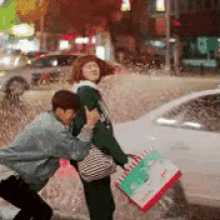A New York subway rider sprays an Asian man with Febreeze and verbally harasses him for standing next to him on the subway.
Jonathan Mok, a 23-year old Oxford university student was brutally beaten by four men and one woman who shouted, "We don't want corona in our country." He was left with multiple fractures on his face and two swollen eyes.
In Washington, Yuanyuan Zhu was yelled and spit at by a man while walking towards the gym, and was nearly hit by a bus when the driver shouted, "shoulda run her over."
On a Los Angeles subway, and Asian woman records a man's berate towards her as he states "every disease has ever come from China" and calling her "a diseased b****."
President Donald Trump has called referred to this virus as "the Chinese virus" on several occasions, and when confronted by news reporters, said nothing about it.
A Belgian school photo under fire for the racism in the photo: the pandas, the bamboo hats, the costumes, the sign
At a local coffee shop in my area, I bought a coffee and the cashier put gloves on as she swiped my card and proceeded to wipe down the machine afterward. For the next customer in line (who was Caucasian), she took off her gloves and used her bare hands to swipe the card.
The number of deaths from the COVID-19 virus in the US has officially surpassed the number of those who died during the 9/11 attacks, and the rapid growth in cases have stripped hospitals of beds, ventilators, and basic essentials like Tylenol.
As the virus upends American life, Asian-Americans are faced with a double threat.
1 in 5 Asian-Americans say that they're afraid to go grocery shopping, refill gas, or even let their kids walk outside.
The reported cases show yelling, attacks (even during this time of lockdown), online harassment. This is a sudden outburst of hate that is reminiscent of that towards Muslims and Arabs following the 9/11 attacks. However, in 2001, President George. W. Bush called for tolerance of American Muslims and urged Americans to be accepting. In 2020, President Trump is using language that many people say is inciting racist attacks.
Trump's calling of the "Chinese" virus
It's not just Asian-American citizens recognizing this trend. Historians, public health experts, global health organizations (including the CDC and the World Health Organizations) have recommended against assigning names to diseases that include a geographic location. Organizations that initially emphasized social distance and hygiene are now taking a stance on reducing stigmas and are emphasizing how associating ethnic groups with diseases can lead to xenophobia.
In addition, several Asian-American politicians, academics, and leaders of nonprofit groups that denounced the racial animus that has risen, and have spoken out against such discrimination and even against Donald Trump. Supporters of all races have protested throughout the crisis, rallying in the streets and fighting to stop the discrimination.
Andrew Yang, a presidential candidate, has encouraged Asian-American voters to rise up, calling the discrimination "a very depressing thing"
There's hate and an unwillingness to accept what's happening. There are people who think it's ok to blame one race of people "at fault" for COVID-19 and take their anger out on them. But that's not the worst part. As many teens (just like yours truly) are under house arrest, the one way we can interact with people outside of our family is through social media -- the place where we can all pretend to be somebody we're not, and the place where we can voice our opinions without direct human confrontation. There have been too many cases of people being "activists" when all they're doing is retweeting posts. There have been too many cases of people standing up for the oppressed (Asians) but seeing one in person and showing their disgust. There are too many factors in today's modern society to pinpoint one main reason as to why the virus has created such a culture surrounding xenophobia.
So, as a student under house arrest, what can we do while practicing social distancing?
- Use what you have to spread awareness WITHOUT increasing fear.
- If this means using your social media account, posting an article, texting a friend, do what you can in your power to spread information.
- Speak out about negative behaviors you see online.
- Maintain the privacy and confidentiality of those seeking healthcare, and for those who need it.
- Thank healthcare workers, first responders, mail carriers, and those working in times of stress.
Discrimination shown from the examples in this article demonstrates how this can happen to anybody and can happen in any corner of the country. This pandemic has not made discrimination justifiable. Everybody can make a change, big or small. It's important to remember that even if everybody is locked in their houses, you can play your role and spread true information and awareness. It's important to watch what you say and reflect on the impact that it can have on people. But most importantly, it's important to wash your hands and practice social distancing, so you as one person can contribute to the containment of the virus. It'll take time and fight, but our country can get through this.
Stay safe!












